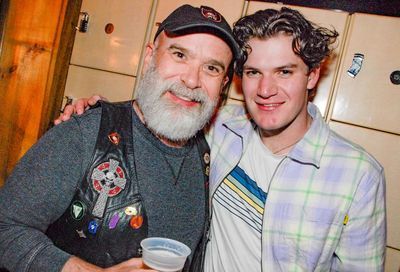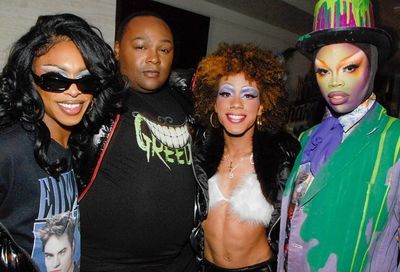Trouble in Texas
Commentary: OutRight
Hardly anyone seems aware of it, but on Nov. 8, Texans will vote on an unusually far-ranging state constitutional amendment banning gay marriage and anything ”similar” to it. Since it’s an off-year election, the turnout is likely to be very low. It’s an excellent — almost unique — opportunity to make a strong showing in a state where we should be blown away. But the campaign against the amendment has been lackluster and marred by poor strategic and substantive decision making.
The proposed state constitutional amendment would define marriage as the union of one man and one woman. Nothing surprising there. But its second sentence goes on to prohibit the state and any of its political subdivisions (like counties and cities) from creating or recognizing any status ”identical or similar” to marriage. That means civil unions are out, and it probably prohibits broad domestic partnership programs too. The amendment might also make enforcement of some private agreements between same-sex partners more doubtful since enforcing them might require a judge to ”recognize” a relationship ”similar” to marriage.
The Texas Marriage Amendment is thus among the most sweeping amendments proposed anywhere in the country. The damage it would do is huge and long-lasting. Short of a ruling that it violates the federal constitution, it could not be reversed except by another state constitutional amendment. That would require a 2/3 vote in both houses of the state legislature, followed by another popular vote. It will be a very long time before a majority, much less a super-majority, of the Texas legislature supports gay marriage or anything like it.
Around the country, state marriage amendments have passed by wide margins. The closest margin came in relatively liberal Oregon, where 56 percent of voters approved it. The largest came in ultra-conservative Mississippi, where 86 percent of voters approved it. In states that border Texas — Louisiana, Oklahoma, and Arkansas — anti-gay-marriage amendments passed with votes of 78 percent, 76 percent, and 75 percent, respectively. Needless to say, fighting the amendment in Texas is an uphill battle.
But two factors make the Texas marriage fight somewhat different, offering the potential of at least a closer margin than in neighboring states. First, the Texas amendment is coming up for a vote in an off-year election in which perhaps only five to seven percent of registered voters would ordinarily bother to show up. This means that a motivated and well-organized minority of voters (like gays or religious conservatives) could make a difference. Most of the other state-marriage referenda around the country have coincided with high-turnout general elections, like the fall 2004 presidential race, where even an intensely concerned minority is overwhelmed.
Second, the only major city in Texas that will decide important local elections in November is Houston. Houston voters, already a huge portion of all voters statewide, should therefore be an even larger factor in this election. And Houston voters are more socially tolerant than voters elsewhere in the state.
When Houston’s disproportionate voice and its relative gay-friendliness are combined with a depressed turnout elsewhere in the state, we have an almost ideal circumstance for a marriage vote. With a smart campaign, we could be in a position to keep the ”yes” vote under 65 percent, which would have to be counted as a moral victory.
But, alas, the anti-amendment campaign has been inept. Start with the campaign director, Glen Maxey. In the 1990s, Maxey served a few undistinguished terms as a Democratic state representative from a liberal district in Austin. He was the first (and so far only) openly gay person to serve in the state legislature. But whatever laurels he earned from that status have long since wilted.
The anti-amendment campaign is running under the alliterative but oblique slogan, ”No Nonsense in November.” While Houston should clearly be the focus of anti-amendment organizing, the No Nonsense organization is based in Austin.
Evidence of gay-community apathy is everywhere. There are hardly any yard signs visible in Houston’s heavily gay neighborhoods. (No Nonsense is trying to sell the signs instead of giving them away.) Go to a gay bar and few of the patrons have even heard there’s an amendment on the ballot.
Maxey and his friends among the Texas gay civil rights establishment are fond of coalitions. In a conservative Republican state, here’s the coalition they have put together to defeat the amendment: Among the eight ”featured sponsors” of the anti-amendment campaign are three partisan Democratic groups, two leftist groups that promote ”social justice,” one statewide gay group that barely pretends to work with Republicans, and another that was founded by the daughter of former Democratic governor Ann Richards. This is, to be sure, a ”coalition.” It is a coalition of losers.
Go to the No Nonsense website and you find a confused, unattractive jumble of logos, icons, and blinking mantras. Click ”talking points.” There, the very first argument against the marriage amendment is one that practically cribs from press releases of the state Democratic party. No Nonsense argues that instead of passing a marriage amendment, the Republican-dominated state legislature should have concentrated on ”real solutions” like child healthcare and equalization of public-school financing.
There is not one word under ”talking points” arguing that gay marriage itself is a good idea. An opportunity to educate people about gay marriage is being lost. And so is another amendment campaign.
Dale Carpenter is a law professor. He can be reached at OutRight@metroweekly.com.
Support Metro Weekly’s Journalism
These are challenging times for news organizations. And yet it’s crucial we stay active and provide vital resources and information to both our local readers and the world. So won’t you please take a moment and consider supporting Metro Weekly with a membership? For as little as $5 a month, you can help ensure Metro Weekly magazine and MetroWeekly.com remain free, viable resources as we provide the best, most diverse, culturally-resonant LGBTQ coverage in both the D.C. region and around the world. Memberships come with exclusive perks and discounts, your own personal digital delivery of each week’s magazine (and an archive), access to our Member's Lounge when it launches this fall, and exclusive members-only items like Metro Weekly Membership Mugs and Tote Bags! Check out all our membership levels here and please join us today!





















